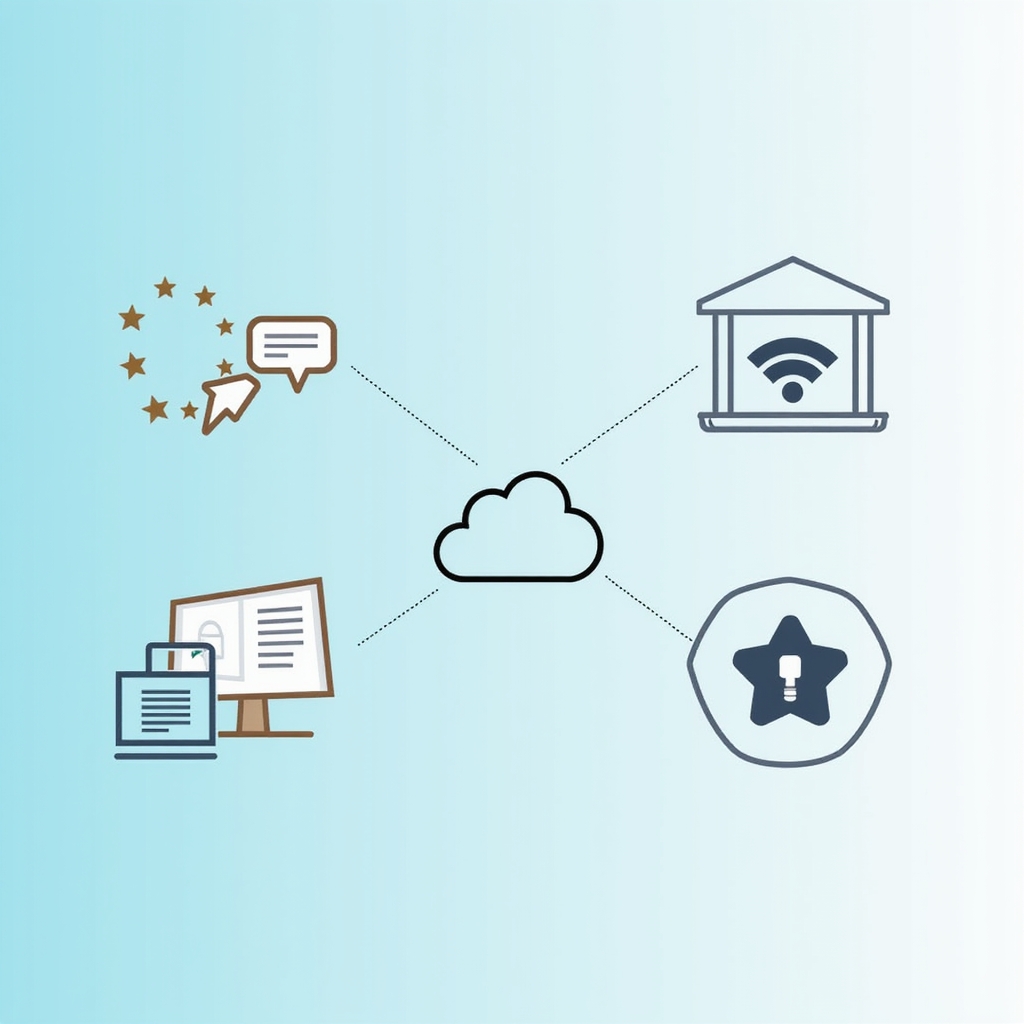The Top Reasons to Use AWS

Amazon Web Services (AWS) is a powerful cloud platform that provides a wide range of services, from infrastructure-as-a-service and storage to artificial intelligence and analytics.
As a leading provider of cloud computing solutions, AWS has earned the trust of developers worldwide. AWS offers a feature-rich environment that enables companies around the world to gain a competitive advantage, from building the foundation of digital infrastructure to running workflow-enhancing applications.
Using AWS, companies can easily create, test and deploy applications with the click of a mouse without having to purchase additional hardware or software. The platform has enabled developers to build products faster by providing unlimited computing power with resources such as EC2 instances, load balancers, S3 buckets, Lambda features, and more. AWS also allows companies to reduce their costs because they only pay for the use of each resource when they need it. In addition, the reliability of AWS allows companies to grow, confident that their applications are secure and running efficiently at all times.
But what are the main reasons to use AWS? In this article, we’ll take an in-depth look at why so many companies choose AWS, from reducing capital investment to improving scalability.
Cloud services: history and general characteristics AWS
Cloud services have rapidly grown in popularity since their emergence over a decade ago.
The roots of cloud computing can be found in the 1960s when computers started moving away from bulky mainframe systems and made way for the introduction of smaller, remote servers.
AWS, or Amazon Web Services, is one of the most renowned cloud service platforms that offers its users a plethora of features such as storage, networking, analytics, and so much more. AWS’s usage of virtualization technology allows users to build easy-to-deploy applications on the cloud with dramatically reduced costs and time frames compared to traditional methods. It also provides high availability for its services and products along with its strong security environment that ensures reliable data protection for customers.
With various pricing plans based on factors like location, usage rate, capacity, and additional service requirements, AWS truly stands out from many other cloud service providers in the market today.
Characteristics AWS:
- Amazon Web Services (AWS) is a cloud computing platform that provides users with a variety of services, including storage, computing, and networking.
- AWS is used by a wide range of businesses and organizations, from small businesses to large enterprises.
- AWS is a cost-effective way to scale your business or organization, as you only pay for the resources you use.
- AWS is reliable and secure, with multiple layers of security to protect your data.
What is cloud computing
Cloud computing is an innovative way to access and use shared computing resources such as networks, servers, storage, applications, and services.
This technology provides on-demand delivery of computing services without managing the complex infrastructure of a local network or on-site server installation.
The ability to deliver data quickly, accurately, and reliably makes cloud computing a truly efficient platform for businesses to rely on.
It is quite difficult to learn AWS, let alone for students to write a dissertation about this cloud storage, in a technical university.
And there can be a lot of problems with that. This can be difficult because so much technical information needs to be included. In addition, students need to make sure they can clearly and concisely state their thoughts and ideas.
However, by taking the time to write a plan and outline for their paper, students can increase their chances of success. In addition, there are a number of resources that students can turn to for help, including online forums and websites devoted to software and various technical topics.
Types of cloud services
Cloud services come in three types:
- “Infrastructure as a Service” – IaaS (Infrastructure as a Service),
- “Platform as a Service – PaaS (Platform as a Service),
- “Software as a Service – SaaS (Software as a Service).
IaaS implies a high degree of virtualization of hardware resources and provision of on-demand virtual machines to customers. The main characteristics used by the customer, in this case, are the number and clock frequency of virtual processor cores, the amount of RAM, and disk space. The cost of the service depends on the necessary computing power and the duration of cloud resource usage. Additional disk resources and auxiliary services can be charged separately. The number of IT resources can be increased or decreased at any time at the client’s request.
PaaS implies that together with the virtual computing resources, the customer also gets a software environment, including an operating system, middleware, tools for software development and testing (Frameworks), as well as a database management system (DBMS).
SaaS uses a specific software product (CRM-system, office applications, accounting services, etc.) on an “as a service” model. The software product itself is deployed at the operator’s physical facilities and does not require local installation by the user. In turn, the client has no access to computing or system infrastructure and pays only for the time of using the software or the cost of the license.
When to choose AWS?
AWS is an excellent solution for both startups and organizations. From small web services to large-scale data center migrations to the cloud, AWS provides a wide range of services that customers can use. To help customers of all shapes and sizes get started on the platform, AWS has released ostensibly niche services like RoboMaker on the one hand and simultaneously created services like LightSail (virtual private server) to help even the smallest workloads with a single server.
AWS also now offers the highest compute execution options and storage facilities on the market. Its wide range of virtual machine types (136 in 26 virtual machine families) allows customers to run everything from small web systems to the largest HPC (High-Performance Computing) and SAP workloads virtually.
Machine learning and artificial intelligence
For machine learning and artificial intelligence, AWS also provides the highest configurations of GPU-enabled virtual machine types. For workloads that require leasing a physical server to meet regulatory requirements, AWS now also provides Bare-Metal-as-a-Service (hardware server for rent). For virtualized workloads, if needed, AWS provides features such as “placement groups” to ensure that computing and storage are performed on specified hardware.
AWS expects different virtual machine sizes to meet your requirements. Therefore, it does not support creating custom virtual machine sizes (vCPU, RAM). Unlike other cloud providers (CSPs), AWS only provides a specific set of virtual machine families with GPUs. AWS does not allow GPUs to be attached to any or all of the virtual machine types in its portfolio.
Cloud storage comes with AWS with different options, such as dynamic resizing and different types of disks (traditional and SSD). Unlike other CSPs, AWS does not limit input/output operations per second (IOPS) by partition size. You can get more IOPS for an additional fee, even for smaller disks.
Provision of relational database services
In the area provided as a serviced relational database service, AWS supports managed databases for MySQL, PostgreSQL, MariaDB, Oracle, and MS SQL as part of its RDS offering. In addition, AWS has its own MySQL and PostgreSQL-compatible databases that boast Oracle-like performance but are available for a small fee. AWS is investing heavily in this and has also announced Multi-Master and Serverless versions of the databases.
For NoSQL databases, AWS has been releasing their DynamoDB product for about five years. It is a development of their SimpleDB database. AWS is a supporter and provides a number of specialized NoSQL DBMSs. These include DynamoDB (key-value), Neptune (graph), and Elasticache (caching for key-value data).
Over the past decade, AWS has improved its portfolio of network services. It started with VPC (Virtual Private Cloud) and related networking features such as security groups, network access control lists, and access gateways. At the time, users still had to configure their own network address translation (NAT) servers, firewalls, and similar nodes. AWS listened to customer feedback and gradually added everything it needed as a network services provider to its portfolio. AWS now provides a managed NAT gateway, VPN gateway, Transit gateway, direct access gateway, etc. AWS also recently announced a VPN client service. This eliminates the need for customers to deploy OpenVPN servers to manage access to cloud virtual machines.
Network security
For network security, AWS has launched managed services to protect against distributed DDoS network attacks (AWS Shield) and Web Application Firewall (WAF), as well as AWS Inspector, AWS Config, and CloudTrail to manage performance inventory, policies, and auditing. The GuardDuty service provides threat detection.
Data security
AWS provides stateful encryption for most of its storage services for data security. AWS also offers key management services such as KMS and CloudHSM. Macie provides a data loss prevention (DLP) service driven by artificial intelligence.
Queuing, messaging, and notification
In queuing, messaging, and notification, AWS provides an AMQP-enabled managed queuing service (Amazon MQ) and its SQS offering. AWS offered Kinesis and recently added a Kafka offering for publications and subscriptions. SNS provides multi-channel integrated notification services that allow customers to be notified by SMS, mobile, SMS, and email. Internally, it also connects with its other services, allowing weakly coupled, event-driven architectures.
AWS serves U.S. government operations in select regions of GovCloud in the United States. Customers who need to provide services to customers in China can rely on the AWS China region, which is provided in partnership with third-party vendors.
Overall, AWS provides a wide range of services and features that are suitable for a significant number of enterprises.
To conclude
The cloud offers a variety of benefits that enable organizations to save time and increase efficiency.
AWS is one of the leading providers of cloud services with an extensive portfolio of products and services. It provides scalability, high performance, reliability, and agility while providing cost savings on maintenance and IT infrastructure.
Anyone who has difficulty understanding this cloud repository and writing essays or essays on it can use a custom writing service engaged in writing custom papers. Essay writing, homework assignments, winning branded content development, and other services are reasonably priced.
With its quick provisioning times, user-friendly interface, strong support team, and global reach, AWS is an excellent option for businesses looking for a cloud solution that fits their unique requirements. It can help companies quickly build applications, store data or easily provide resources on demand.
Considering all these, it’s no surprise that AWS has become one of the top choices among companies when considering cloud services.



Comments